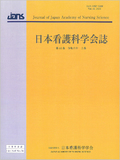Japanese
English
- 販売していません
- Abstract 文献概要
- 参考文献 Reference
- サイト内被引用 Cited by
要旨
目的:訪問看護師向け在宅看取り教育プログラム(PENUT)を開発し,その有効性を検討した.
方法:訪問看護師を介入(I)群とwait list control(C)群に無作為に割り付け比較した.PENUTは講義20項目(2日間)と演習2項目(1日間)で構成した.属性,在宅看取りケア態度,在宅看取りケア件数の質問紙調査をベースラインと各群研修後に行った.
結果:I群62名,C群59名を分析した.I群はC群より有意に死にゆく患者へのケアの前向きさ(3.2±5.1,0.5±4.1),終末期ケアに対する自信(0.63±0.78,0.28±0.79),医師とのコミュニケーションへの自信(0.52±0.72,0.04±0.60)が増加し,症状緩和の困難感(−0.43±0.92,0.07±0.75)は減少した.
結論:PENUTは訪問看護師の在宅看取りケア知識および態度の向上に有効である.
Objective: We developed a training program for home-visiting nurses caring for terminal patients, called Program of End-of-life care for home visiting NUrses Training(PENUT). We therefore sought to examine the effectiveness of this program in a randomized controlled trial.
Methods: We randomly assigned home-visiting nurses to either an intervention group or a waitlist control group. PENUT consists of 20 lectures(two days) and 2 exercises(one day). Questionnaires regarding attributes, attitudes toward terminal care, and the number of home end-of-life care cases were administered at baseline and after each group training session.
Results: There were 62 participants in the intervention group and 59 in the wait-list control group who participated in all programs and surveys. After the training sessions, nurses in the intervention group were significantly more positive about caring for dying patients(3.2±5.1 vs 0.5±4.1), more confident in terminal care(0.63±0.78 vs 0.28±0.79), and more confident in communicating with physicians(0.52±0.72 vs 0.04±0.60) and having less difficulty in symptom palliation(-0.43±0.92 vs 0.07±0.75) than were those in the wait-list control groups.
Conclusions: PENUT was found to be effective in improving home-visiting nurses' knowledge and attitudes in end-of-life care.
Copyright © 2024, Japan Academy of Nursing Science. All rights reserved.


